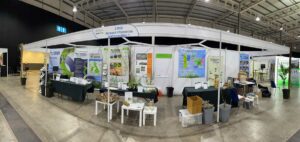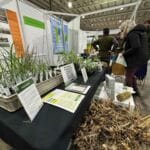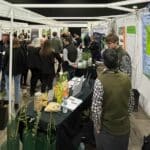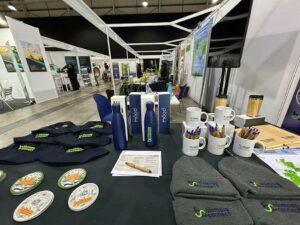The recent Low Carbon Agriculture Event held at Stoneleigh was a busy and fruitful two days for enthusiasts and practitioners in low-carbon farming. Attendees found the Biomass Connect stand to be a hub of technical knowledge, courtesy of the dedicated Biomass Connect knowledge exchange team. Moreover, the stand proudly displayed practical innovations stemming from the DESNZ-funded Biomass Feedstock Innovation (BFI) programme, which made its collective debut at the event.
The comprehensive representation of the BFI programme allowed for discussions from basic inquiries to in-depth conversations. Having multiple partners on the stand facilitated a one-stop destination for all biomass-related queries, encouraging and inspiring cross-pollination of ideas between research and commercial endeavours.
Visitors to the stand were invited to write down their questions around biomass use on a prominently displayed poster. Questions included whether biomass was too valuable to burn, concerns about potential invasiveness of non-native crops, and which of the biomass crops could be considered feed for livestock. Answers to these queries will be shared on our social media platforms through our Friday Fun Facts posts.
Feedback from visitors highlighted the top three perceived benefits of biomass:
- energy independence,
- contribution to achieving net-zero targets, and
- providing a sustainable energy source.
Other benefits mentioned included biodiversity enhancement, soil improvement, and fostering rural job opportunities.
The stand attracted a diverse range of attendees, including potential biomass growers, researchers, advisors, and commercially minded individuals, both local and international. The presence of overseas visitors underscored the global interest in biomass initiatives, with commendations for the excellent range of resources provided by BFI innovation projects and Biomass Connect.
- Crop display on the Biomass Connect Stand at LCA 2024
- Busy with attendees at the Biomass Connect stand
The stand also worked as an opportunity for a young entrepreneur from Grouse Fibre to discuss some of their new ideas and products with a group of experts in biomass. One such product, a biodegradable material derived from agro waste was discussed as a possible mulch layer that may help to reduce chemical weed control for establishing crops and also to improve soil moisture retention as it degraded. This discussion was enhanced by the highly enterprising Hunt brothers from BGI, who as entrepreneurs themselves, suggested further the applications they felt this new material could have within the Biomass sector
Another hopeful entrepreneur expressed aspirations of securing a contract to install Combined Heat and Power plants at numerous poultry farms across the UK. He pondered the feasibility of integrating biomass boilers alongside these plants, powered by biomass cultivated on-site. He suggested that the sites distributed nationally often had substantial land areas, and he envisioned ample potential for growing biomass crops as a sustainable, homegrown energy source.
Visitors explored opportunities for biomass utilisation in various sectors, from poultry farming to retail outlets. Discussions also delved into soil carbon measurements, and the need for ongoing efforts to harmonise carbon reporting.
- Jeanette Whittaker (Biomass Connect project lead), chairing the Biomass, Biochar, and Net Zero session.
- Jeanette Whittaker and Patricia Thornley (Director, Supergen Bioenergy)
A highlight of the event was the session chaired by Jeanette Whitaker, project lead for Biomass Connect, focusing on the role of woody biomass, perennial energy crops, and biochar, in governmental biomass strategies and net-zero plans. Expert speakers provided insights into sustainability, biomass crop options, pyrolysis, and carbon sequestration.
Visitors sharing their perspectives on the emerging biomass sector received Biomass Connect travel mugs or insulated water bottles as tokens of appreciation, which were warmly received.
Stay tuned for more updates on our website as we continue to reflect on the enriching experiences and insights garnered from the Low Carbon Agriculture Event.










